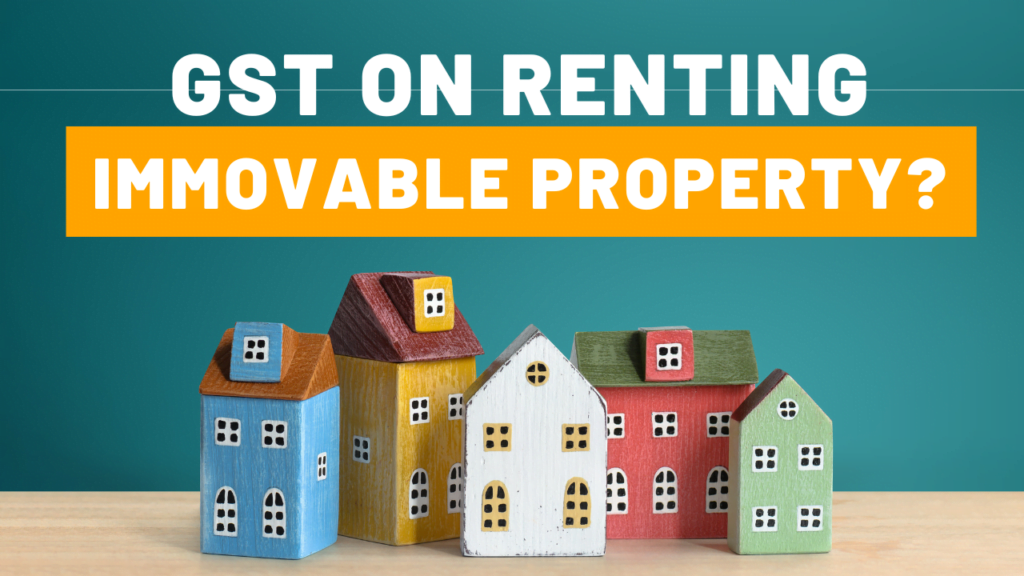Since the implementation of GST, every business has gone through tremendous change. With the simplification of the indirect tax systems and filing of returns, it has made business to operate with ease by integrating all the indirect taxes in India, except few products.
If you have a property to rent, you necessarily need to learn the regulations and tax under GST on renting property. In this post, We will explore the latest updates, provisions, and implications of GST on renting residential and commercial properties in India
Exceptions and Conditions:
First, we will go through the exceptions and conditions in which GST is applicable and how much needs to be discharged as goods and services tax.
1. Residential Property for Business: If you rent a residential property for commercial purposes (like a guest house or any GST liable business), GST becomes applicable at 18%. So, you have to collect the tax and pay it to the Government.
2. GST on Hotels:
If the tariff of a hotel room is less than 1000 rupees, no GST applicable. But, for hotel rooms with tariff 1001-7500 rupees is 12% and from above 7500 rupees per day rent, GST – 18% is applicable.
3. Tax Exemption for Religious Places:
If you are running a registered charitable trusts or religious institutions, renting out rooms for public religious purposes are exempt from GST, subject to certain conditions:
- The rent for each room should be less than ₹1,000 per day.
- The monthly rent for shops or other spaces should be below ₹10,000.
- The daily rent for community halls or open areas should be under ₹10,000.
4. GST on PG or Hostels:
I don’t want to confuse. There was the same issue before the Karnataka AAR who confirmed the imposition of 12% GST as the PG or Hostels do not fall under the definition of “Residential dwellings”. However, the latest judgements in this matter by Hon’ble High Court of Madras, has ruled out the GST applicability on PGs or Hostels. But, you should wait for official clarification from the CBIC department. Read full article here – No GST on renting of hostel rooms for residential purpose: Madras High Court.
5. Renting a service along with the property:
If the rent includes services like maintenance, security, or housekeeping, the tenant might need to pay GST under RCM, depending on the nature and value of these services. You can also charge separately for these from your tenant so that proper records and transactions can be maintained.

FAQs on renting property
Q1- I don’t have GST registration in order to collect tax?
– You are liable to take GST registration, if the threshold limit crosses Rs.20 lakh per annum. Otherwise, you can tell the tenant to pay tax under RCM and avail input tax credit on it, as this service is received from a non-registered person.
Q2. Is GST applicable on renting residential property only?
– No, GST is not applicable on renting of a residential property irrespective of the amount collected. But, don’t forget to pay income tax.
Q3. What HSN should I use for tax invoice?
– The GST rate is 18% only on both renting of residential and commercial property.
| HSN – 997211 | HSN – 997212 |
| Rental or leasing services involving own or leased residential property ORRenting of Immovable property | Rental or leasing services involving own or leased non-residential property ORRenting of Immovable property |
Q4. How to apply GST on rent?
– You can apply GST (CGST 9% and SGST 9%) on rent separately. Suppose, you charge rent Rs.20,000 per month, on that GST will be Rs.3600, So total invoice value should be Rs.20,000 + Rs.3600.
Let’s learn with example:
Example:
- Mr. Sharma rents out his commercial office space for ₹50,000 per month. Since he is registered under GST and the rent is for commercial use, he needs to collect GST at 18%.
- The total GST amount for the month will be ₹50,000 x 18/100 = ₹9,000.
- Mr. Sharma will collect a total of ₹59,000 (₹50,000 rent + ₹9,000 GST) from the tenant.
- He will then need to file his GST return and deposit the collected ₹9,000 GST to the government.
- In return, the tenant will avail input tax credit of ₹9,000 paid as GST to the landlord.
Conclusion:
Both owners and tenants need to know about GST when renting out a place. You can make sure you’re following the latest rules, keeping good records, and getting professional help if you need to, and avoid any possible fines. Remember that talking to a tax professional can help you figure out the details of your situation and make sure that your rented properties are taxed correctly.











1 Comment
View Comments